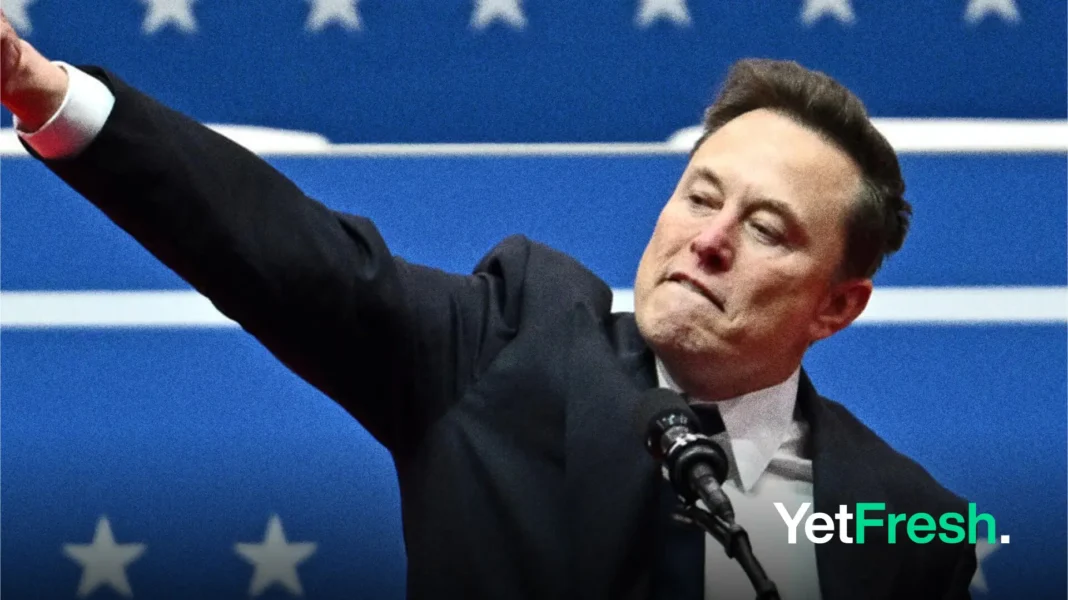Summary:
- Elon Musk sparked outrage at Donald Trump’s inauguration rally by making gestures widely compared to Nazi salutes.
- The Anti-Defamation League defended Musk, calling the gesture an awkward moment, but critics, including Alexandria Ocasio-Cortez, condemned it.
- Far-right groups celebrated Musk’s actions online, intensifying scrutiny of his political affiliations and influence.
- Musk dismissed the backlash on his platform X, reposting memes and mocking accusations as overblown.
Elon Musk, the billionaire entrepreneur and CEO of Tesla, SpaceX, and X (formerly Twitter), has ignited a firestorm of controversy following his appearance at a rally celebrating Donald Trump’s second presidential inauguration on January 20, 2025. During his speech at Washington D.C.’s Capital One Arena, Musk made a hand gesture that many have compared to the Nazi salute, sparking widespread backlash and debate.
While addressing the crowd of Trump supporters, Musk struck his chest with his right hand before extending his arm upward at an angle with his palm down—a movement repeated twice during the event. Social media users and public figures swiftly reacted to the gesture, with some labeling it a “Nazi salute.” Ruth Ben-Ghiat, a historian specializing in fascism, described it as “a Nazi salute and a very belligerent one too.” Israeli newspaper Haaretz also referred to it as a “Roman salute,” historically associated with fascism.
Criticism was immediate and widespread. Democratic Congresswoman Alexandria Ocasio-Cortez condemned both Musk’s actions and the Anti-Defamation League (ADL), which defended Musk by calling the gesture an “awkward moment of enthusiasm.” Ocasio-Cortez stated on social media: “Just to be clear, you are defending a Heil Hitler salute that was performed and repeated for emphasis and clarity.”
The ADL’s statement attempted to downplay the incident, urging people to extend “grace” and describing the gesture as unintentional. However, this stance further fueled criticism from various quarters. On social media platform X, which Musk owns, he reposted memes mocking the controversy and dismissed accusations with comments such as “The ‘everyone is Hitler’ attack is sooo tired.”
The incident overshadowed Musk’s speech, in which he praised Trump supporters for their role in securing the president’s reelection. Musk also emphasized his commitment to advancing Trump’s agenda through his newly appointed role in the Department of Government Efficiency (DOGE), an initiative aimed at cutting federal spending. During his remarks, Musk lauded plans for space exploration, envisioning American astronauts planting flags on Mars.
Far-right groups celebrated Musk’s gesture online. Neo-Nazi figure Christopher Pohlhaus reportedly expressed approval on Telegram, while Andrew Torba, founder of Gab—a far-right social media platform—called it “incredible.” These reactions have intensified scrutiny of Musk’s political affiliations and his perceived alignment with far-right ideologies.
Musk’s actions come amid growing concerns about his influence in both politics and media. As a major donor to Trump’s campaign and a vocal supporter of far-right European politicians like Alice Weidel of Germany’s Alternative für Deutschland party, Musk has faced criticism for amplifying extremist views on X. His platform has been accused of enabling misinformation and fostering divisive rhetoric.
The controversy surrounding Musk’s gesture highlights broader tensions in American politics as Trump begins his second term. The inauguration itself has drawn criticism for its polarizing tone and the prominent roles given to tech billionaires like Musk in shaping government policy.
As debates rage over whether Musk’s gesture was intentional or misinterpreted, its impact on public discourse is undeniable. The incident underscores the challenges of navigating political symbolism in an era marked by heightened polarization and social media scrutiny. Whether or not Musk intended to evoke historical parallels, the fallout from his actions serves as a stark reminder of the power—and responsibility—of public figures in shaping public perception.
Source: The Guardian




